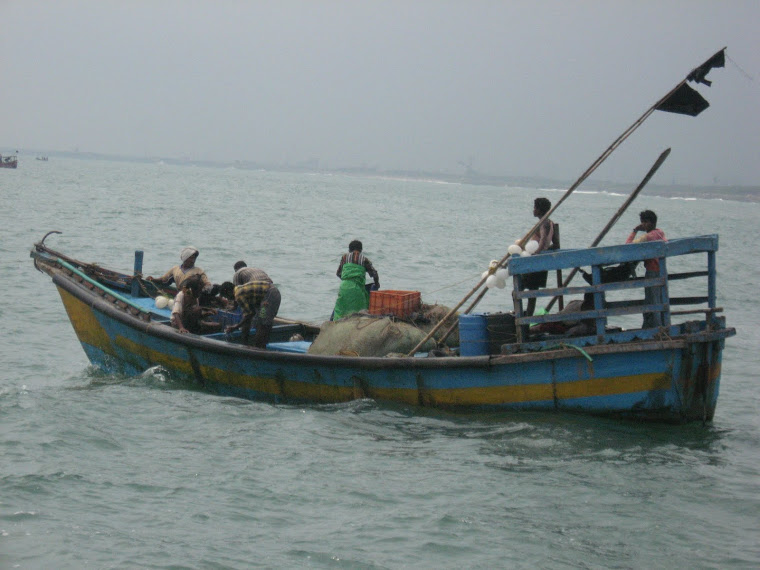Kendrapara: The marine fishermen have also become victims of climate change as they are unable to catch Hilsa fish in the current season due to erratic monsoon.
Take the case of Amrut Das, 45, a fisherman of Kharnashi. He is now a worried man. After the completion of fishing ban and fish breeding season, he recently went to the sea with his mechanized boat to catch fish. But to his ill luck, the fish catch within their operation areas is not impressive. The worth of his fish catch is less than his expenses for going to the sea with the fishing boat along with his crew members. As a result, he is spending sleepless nights thinking about how he would feed his family.
According to Das, the marine fishermen generally get only four months in a year for catching fish in the Bay of Bengal and the other eight months they remain idle because of a ban on fishing to allow Olive Ridley sea turtles to nest and fish to breed.
The fishermen generally wait for the beginning of the fishing season, from July to October end, to earn enough for the whole year. But as these four months generally fall in monsoon season, the fishermen have to face rough weather, cyclonic atmosphere and depression most of the time, diminishing their chances of good catch during the four-month fish season.
“What shall we do to feed our family? We are now thinking about our bleak future as the fish catch has reduced this time and it is not encouraging at all. Last two years, the Hilsa fish catch was encouraging. Now, it has reduced a lot compared to last year,” said Tusar Sardar, Secretary of Maa Ramchandi Boat Owners Association.
A couple of years back, during this time, the fishing jetty of Kharanashi was brimming with activity. But now, a large fleet of fishing boats is all crammed in, hull to hull, as if they are not wanted anymore due to dwindling fish catch.
According to Anantha Bandhu Das, a trawler owner, fish catch, especially the Hilsa, generally goes up in the sea when the eastern wind along with low pressure occurs during this time. But this year, the monsoon has played truant affecting the Hilsa catch.
Now, the fishermen are not taking any chance to go to the sea for catching fish with their mechanized boats as a fear of loss looms. As they have seen, the loss is double than the expenses. A total drop in Hilsa catch has brought this fact into sharp focus this time.
“The drop in the Hilsa yield is unprecedented. Never before, the catch of other fishes, including Hilsa, had fallen to such a low level as this year during this time. Those who had pinned their hopes on bountiful catch are left thoroughly disappointed this time while returning from sea. Earlier, quintals of Hilsa were caught during this time but now the catch has become a dream in the present monsoon season. Hardly a gillnet or a trawler manage to catch one or two Hilsa in a trip, said Tusar Sardar.
For going to sea with the gillnet boat, a trawler owner generally spends nearly Rs 15,000, including Rs 8000 for fuel and Rs 3,000 for ice and Rs 4,000 for crew members. But the fish catch now is less than the cost of expenses, added Narayan Haldar, a leader of marine fishermen.
The peculiar habitat of Hilsa makes it impossible to breed it artificially through aquaculture, unlike other fish. The adult Hilsa swims several kilometres upstream to freshwater from the sea for spawning and returns to saline water after that. The eggs hatch in freshwater and the sub-adult Hilsa flows back downstream into the sea, a process that takes a few months.
Generally, during the low pressure, the fishermen catch plenty of Hilsa at the confluence of river mouth of Mahanadi and Bay of Bengal.
But this year, in the monsoon season, the rain is playing hide and sick and low pressure rain has not occurred on this coastal part. As a result, the Hilsa is yet to be fished out from the sea. Besides, the fresh water from Mahanadi has not been reaching the sea due to lack of rain, said Manas Ranjan Sahu, Assistant Director of Marine Fishery Department, Kujanga.
Last year, during the monsoon period, Hilsa fish catch was encouraging. Fish catch reduces due to several factors such as the sea temperature, climate change, sea currents and wind pattern.
However, another fact that can’t be overlooked is as fish is migratory in nature, there is every possibility that they might have migrated to other parts of the sea, stated Sahu.
Nevertheless, the Fishery Department is yet to monitor the situation.
PNN
